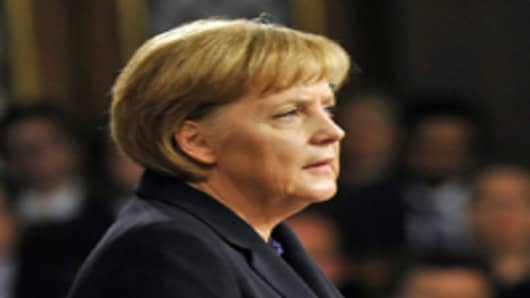Germany is poised to bow to international pressure and allow a temporary increase in the euro zone’s financial “firewall” this week, to prevent the crisis in the region’s periphery spreading to other member states.
Officials in Berlin signalled on Sunday that the government would allow funds to be boosted as a way of calming financial market pressures.
Angela Merkel, Germany’s chancellor, had resisted any increase, despite pressure from most of her euro zone partners and the US administration, because she risks a political backlash from sceptical allies in her ruling coalition if it means any increase in Germany’s overall financial guarantees for its partners. But the thinking in Berlin is that she cannot resist the international pressure indefinitely.
Olli Rehn, EU commissioner for monetary affairs, expected euro zone finance ministers to reach a decision at a meeting in Copenhagen this Friday.
“The key thing now is to conclude the comprehensive crisis response,” Mr Rehn said after two days of informal meetings with other European leaders in Saariskelä, a Finnish hamlet above the Arctic Circle.
Senior European officials said a consensus appeared to be building behind Mr Rehn’s “mid-range” option, which would allow the 440 billion euros ($583 billion) European Financial Stability Facility, the current temporary rescue fund, to keep running when a new permanent 500 billion euros fund, called the European Stability Mechanism, starts up in the middle of this year.
That would boost the rescue system’s overall firepower to 940 billion euros ($1.246 trillion), although with about 200 billion euros committed to Greek, Irish and Portuguese bailouts, the total available would be 740 billion euros.
According to an options paper circulated before Friday’s meeting, Mr Rehn’s preferred option would be to make the 940 billion euros combined total permanent but the mid-range option – likely to be Berlin’s favourite – would allow the system to fall back to 500 billion euros once the EFSF expires in mid-2013.
Even though the firewall increase would only be temporary, Mr Rehn’s staff wrote that it was likely to be enough to convince the International Monetary Fund to increase its own resources to $1 trillion. Christine Lagarde, the IMF chief, has said she will not advocate increasing IMF resources to help reinforce the euro zone firewall unless EU countries act convincingly first.
One senior EU official said the attractiveness of Mr Rehn’s mid-range option was that, unlike making the 940 billion euros permanent, it would not require the German government to go back to the Bundestag for new approvals. It could be backed by finance ministers in Copenhagen and then formalised when the ESM’s board of governors meets.
The only other country that has not publicly backed the increase is Germany’s fellow triple A ally Finland, where increasing the size of the euro zone bailout funds has proved politically controversial.
Jyrki Katainen, the Finnish prime minister, said, in an interview with the Financial Times, he was willing to find a “good compromise” and had “some numbers in my mind” about how large the total should be. He declined to give a specific figure, however, and said he was worried that making the system too large could add to the debt loads of creditor countries, destabilising the euro zone.
“It must be high enough but it can’t be too high, because otherwise the liabilities of the firewall easily become too challenging for the member countries and then it would destroy the credibility of the member countries’ economy,” he said.
Another complicating factor could be Mr Katainen’s insistence that the euro zone receive assurances that the IMF will move forward with its increase before he will agree to an enlarged euro zone fund. IMF shareholders are not due to decide on the issue until spring meetings in Washington next month. Mr Katainen indicated that he may be willing to accept informal assurances.


